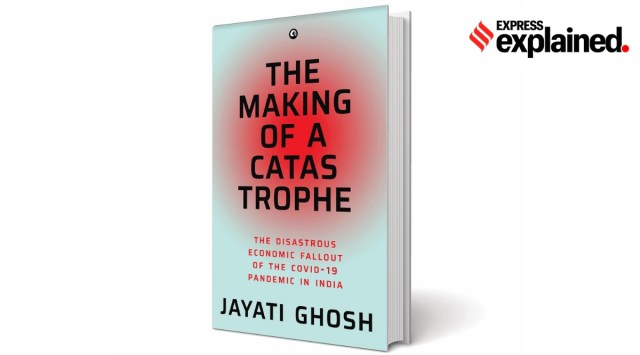Udit Misra is Senior Associate Editor. Follow him on Twitter @ieuditmisra ... Read More
© The Indian Express Pvt Ltd
- Tags:
- Explained Books
Latest Comment
Post Comment
Read Comments
 The Making of a Catastrophe: The Disastrous Economic Fallout of the COVID-19 Pandemic in India. By Jayati Ghosh; Aleph Book Company
296 pages; Rs799
The Making of a Catastrophe: The Disastrous Economic Fallout of the COVID-19 Pandemic in India. By Jayati Ghosh; Aleph Book Company
296 pages; Rs799The Covid-19 pandemic wreaked havoc across the world. Every country, including the so-called developed nations and the high-income ones, struggled to deal with the health outcomes. However, such a broad-brush understanding fails to recognise that Covid affected different people differently. For instance, a migrant labourer was far more deeply affected than someone who could work from home and continue to earn almost the same wages.
Beyond the direct health impacts, the disruption to normal life due to Covid-19 essentially accentuated the existing vulnerabilities of many. And it was in this context that the role of governments became all-important. The policy response, which differed from one country to another, was critical in deciding how citizens of a country, especially the most vulnerable ones, coped with the pandemic’s economic fallout.
In this book, Jayati Ghosh, professor of economics at the University of Massachusetts, argues that beyond the health and mortality impacts, the economic and social devastation in India was a result of the central government’s actions and inaction.
“Very significant policy failures — acts of both commission and omission — were responsible for the widespread and pronounced decline in the people’s livelihoods and in many of the basic indicators of well-being among the population, and caused major setback to the development project of the country,” she writes in the book.
To begin with, “an unplanned and brutal lockdown and the unthinking adoption of containment strategies” were imposed without consultations and at a time when there were very few cases of the disease. “The more expensive (but more effective) strategy of testing, tracing, isolating, and treating those infected, was not implemented,” she writes.
Then, “when the economic disaster became too extreme, the central government proceeded to ‘unlock’ the economy even as cases mounted and infections spread rapidly, thereby putting more people at risk,” she writes.
Also, the government’s “conservative fiscal stance…prevented wage incomes from increasing, and set in motion additional contractionary tendencies that will damage economic prospects in the medium term”.
According to Ghosh, the policy response worsened class and caste divides. For example, informal workers were denied their livelihood without providing compensatory social protection. She argues that the central government used the opportunity presented by the lockdown to centralise powers and crush dissent, and passed controversial legislation such as the farm laws (now repealed) without debate.
Before closing out the book, Ghosh provides the policy solutions to “get the Indian economy and the Indian people out of this mess”. “Redemption requires…a significant increase in public expenditure, especially in areas with high multiplier effects, such as health, nutrition, social services like education…,” she states. To finance the increased spending, Ghosh suggests imposing “solidarity taxes” on the extremely wealthy and “reforming tax systems” to prevent MNCs from moving profits out of India.
Books Explained appears every Saturday. It summarises the core content of an important work of non-fiction.